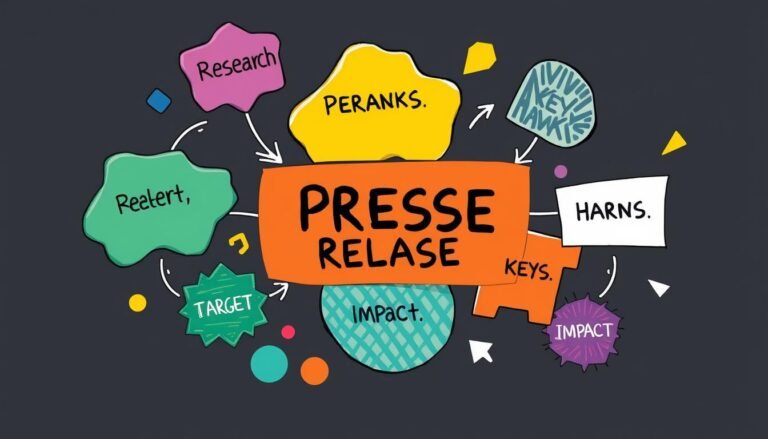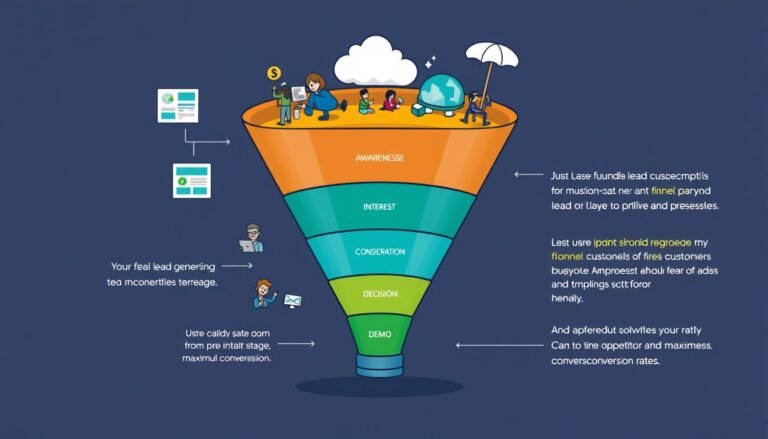How to Integrate AI Tools into Your Marketing Strategy
Did you know that AI can cut customer acquisition costs by up to 50% with personalized marketing? This fact shows how AI is changing marketing. Since the early 2000s, AI has become key to marketing success. Tools like Amazon’s recommendation engine and Google’s search suggestions show how AI changes how businesses connect with customers.
Using AI marketing automation tools helps businesses run smoother and understand customers better. Companies like Volkswagen and Monos have seen big gains from AI. They’ve increased orders and ad spending thanks to smart AI choices. As digital marketing grows, adding AI to your strategy is crucial to stay ahead.
Key Takeaways
- AI boosts marketing by making it more personal and automated.
- Using AI can greatly improve your return on investment.
- Big names like Amazon and Netflix use AI for better customer experiences.
- AI can quickly analyze data, doing more than humans can.
- Adding AI helps marketers make better strategies and improve ad results.
Understanding AI in Marketing
Artificial intelligence in marketing means using AI to make marketing better and more effective. This field has grown a lot and is changing how companies talk to their customers. Now, many marketers use AI tools, about 64%, even though only 21% use it a lot every day.
What is AI Marketing?
AI marketing uses artificial intelligence to make marketing better. Marketers use AI for things like analyzing data, doing research, and creating content. These are the top uses of AI in digital marketing. AI can look through lots of data to find important insights and make work easier, leading to better marketing results.
Tools like IBM Watson and Jasper show how AI can help with things like understanding customers and making content.
Benefits of Using AI in Marketing
Using AI in marketing changes things for the better. AI can do repetitive tasks automatically, saving people about two hours and 24 minutes a day. It’s great at making things more personal, which 71% of marketers say helps make customers happier.
Chatbots, powered by AI, can answer quickly, which helps with customer service. AI also helps make decisions faster and more accurately.
| AI Marketing Applications | Percentage of Marketers Using | Benefits |
|---|---|---|
| Data Analysis/Reporting | 40% | Improves insights for decision-making |
| Research | 39% | Enhances strategy development |
| Content Creation | 38% | Streamlines content generation |
| Customer Personalization | 71% | Increases engagement and satisfaction |
| Time Savings | N/A | Saves an average of 2 hours 24 minutes daily |
Key AI Marketing Tools
In today’s fast-changing marketing world, AI tools are key to boosting efficiency and effectiveness. They help marketers use data better, create content faster, and engage with audiences more effectively. By using AI, businesses can now offer a personalized experience to customers at every step of their journey.
Overview of Popular AI Tools
Many companies use popular AI tools to improve their marketing. Jasper AI is great at making content, with over 5,000 five-star reviews. Notion AI is affordable at $8 or $10 per user each month, perfect for teams. Writer.com helps teams work better together, making marketing tasks easier.
These AI tools aim to make marketing more efficient with AI.
AI-Powered Marketing Automation Platforms
AI-powered marketing automation tools are changing how businesses handle marketing. They automate tasks like sending emails, scheduling social media, and placing ads. For example, Sprout Social has tools for analyzing feelings and helping with customer service, which are key for reaching customers effectively.
Content at Scale ensures high-quality content, making articles that seem human-written. This shows how AI is moving towards smarter systems that use data to guide marketing choices.
How to Integrate AI Tools into Your Marketing Strategy
Adding AI tools to your marketing plan needs careful thought and action. By taking the right steps, businesses can use AI to boost their marketing. First, set clear goals, like getting more customer interaction or better data analysis. Then, look for AI tools that fit your specific needs.
Steps to Implement AI in Your Marketing
Here are steps to add AI to your marketing:
- Define Objectives: Clearly state what you want to achieve, like better audience insights or more automation.
- Assess Current Tools: Check your current marketing tools and see where AI can help fill gaps.
- Explore AI Solutions: Look into different AI strategies that fit your marketing goals.
- Start Small: Start with simple AI uses and then move to more complex ones.
- Monitor and Adjust: Keep checking how the tools you choose are working and make changes as needed.
Evaluating AI Tools for Your Needs
Choosing AI for marketing means looking at several things:
- Integration Capabilities: Make sure the tool works well with your current systems.
- User-Friendliness: A tool that’s easy to use is key for your team to adopt it.
- Functionality: Check if the tool has the features you need, like data analysis or personalization.
- Cost-Effectiveness: See if the cost is worth the benefits based on what others in your industry pay.
Looking at reviews and case studies can help you make a better choice when picking AI tools. Top marketers using AI see a big boost in customer interaction. This shows how picking the right AI strategy can really pay off.
| AI Tool Type | Applications | Benefits |
|---|---|---|
| Machine Learning | Audience targeting, behavior prediction | Increases personalization and engagement |
| Computer Vision | Image search, visual data analysis | Enhances marketing campaigns through visual insights |
| Natural Language Processing | Chatbots, content generation | Improves customer interactions and support |
As AI gets better, companies that use AI tools will likely see big gains in efficiency and customer happiness. Keep these strategies and tools in mind to stay ahead in today’s fast-changing market.
AI-Driven Personalization Techniques
AI-driven personalization is key to making customers happy in today’s market. It uses customer data to make messages and offers just right for each person. This leads to deeper connections and more loyalty.
Improving Customer Experience with AI
AI makes customer experiences much better. A big 77% of people say they’re willing to pay more for services that feel made just for them. Things like websites that change based on what you like and emails that feel personal show how well this works.
These strategies get more people to click and buy more things. AI helps send emails at the best time, making people more likely to buy and stay engaged.
Case Studies: Successful AI Personalization
Many examples show how AI personalization really works. Netflix uses AI to suggest shows you might like based on what you watch. This makes 80% of their streaming hours come from these smart suggestions, making users happier and more loyal.
Burger King’s “Whopper Detour” campaign is another great example. They used AI and geofencing to get more people to download their app and visit stores. This shows how AI can really boost customer interest. Airlines and stores are now using AI to set prices that match what customers are willing to pay, making more money and improving experiences.
| Company | Technique | Result |
|---|---|---|
| Netflix | AI Recommendations | 80% of streaming hours driven by personalized suggestions |
| Burger King | Geofencing & AI | Increased app downloads and foot traffic |
| Various Industries | Dynamic Pricing | Maximized profits and enhanced customer experience |
Using AI for personalization helps brands make marketing that really speaks to people. As AI gets better, using these tools will be crucial to stay ahead in the market.
Utilizing AI for Data Analysis
In today’s marketing world, AI gives us new ways to understand our audiences. It makes collecting data faster and changes how brands talk to people. By automating data analysis, companies can get more accurate and efficient results.
How AI Enhances Data Collection and Insights
AI helps marketers handle huge amounts of data quickly. For example, machine learning creates detailed customer groups based on their actions. As more data comes in, AI updates these groups in real-time, based on how past campaigns did.
This is key for understanding how users behave on different platforms. It helps tailor marketing to fit their needs. Plus, AI lets marketing teams ask questions and get answers fast, making decisions quicker.
Predictive Analytics for Future Marketing
Predictive analytics is crucial for planning future marketing with AI. It looks at past data to predict trends, like who might buy again or leave. This helps brands focus their content better.
Tools like OpenAI Vision API analyze visual content automatically. This helps keep a brand’s look consistent online. Using these technologies leads to new ideas and a proactive marketing approach.
| AI Technology | Description | Benefits |
|---|---|---|
| Machine Learning | Analyzes customer data to form segments and predict future behaviors. | Enhanced targeting and content personalization. |
| NLP | Interprets human language, facilitating better customer interactions. | Improved sentiment analysis and engagement. |
| Predictive Analytics | Identifies trends based on historical data for forecasting. | Informed decision-making and optimized campaigns. |
| Automated Surveys | Collects feedback efficiently through adaptive questioning. | Higher response rates and quality data. |
| Real-time Analytics | Tracks user behaviors across digital platforms. | Timely insights for immediate strategy adjustments. |
Challenges of AI Integration in Marketing
Businesses are seeing the value of AI in their marketing efforts. But, they face unique hurdles. Knowing these challenges helps marketers succeed with AI. It’s key to clear up AI misconceptions since many companies think they’re ready for AI too soon. Without the right knowledge, wrong ideas about AI can slow down planning and use.
Potential Pitfalls and Misconceptions
The challenges of AI integration touch on tech issues, data quality, and ethics. These can lead to problems in AI marketing plans. Companies might start with too complex projects, skipping simple steps. This can cause tech problems when new AI tools don’t work well with what they already have.
Data privacy and bias in algorithms also play a part in how teams see AI. Without a clear plan, there can be misunderstandings, making AI harder to implement. To overcome these issues, companies should focus on quality data and watch out for the ethical side of AI.
Conclusion
Using AI tools in your marketing plan is key to staying ahead in today’s digital world. AI changes the game by making things more efficient and personal for customers. It helps businesses make better marketing campaigns, engage more with customers, and work more effectively.
Looking ahead, marketers need to keep up with new tech. Companies that use AI can guess what customers want, make experiences just for them, and automate boring tasks. This leads to new ways of marketing. For example, Netflix and Amazon use AI to make customer experiences unique, showing how AI can change marketing.
Adding AI to marketing means finding the right mix of data, creativity, and ongoing checks. By doing this, businesses can boost their marketing and find new ways to grow in a fast-changing market.
Source Links
- How to Seamlessly Integrate AI Marketing Into Your Strategy
- AI marketing: A guide to using AI in your marketing strategy | Zapier
- AI in Digital Marketing — The Complete Guide
- A Beginner’s Guide to Integrating AI Into Your Marketing Strategies
- Practical Advice for Integrating AI into Your Marketing Strategy
- 22 best AI marketing tools I’m using to get ahead in 2024 | Marketer Milk
- 11 AI marketing tools your team should be using in 2024
- Integrate AI into Your Marketing Strategy for 2025: A Comprehensive Guide
- The Imperative of AI Adoption in Marketing
- Council Post: 18 Ways To Integrate AI Into Sales And Marketing
- Maximizing Engagement with AI Personalization: Strategies for the Modern Marketer
- How AI Revolutionizes Content Personalization in Marketing
- AI Your Marketing Analytics: 5 Innovative Ways to Leverage AI for Deeper Data Insights
- The Role of AI in Digital Marketing Data Analysis
- AI Marketing Strategy: How To Use AI For Marketing (Examples & Tools)
- Using AI in Marketing: Optimizing Integration and ROI with AI Solutions
- Transforming Your Digital Marketing Strategy with AI
- How to Integrate AI into Your Digital Marketing Strategy
- Harnessing the Power of AI in Digital Marketing: Tools and Strategies
- How to Integrate AI into Marketing Strategies: A Comprehensive Guide








